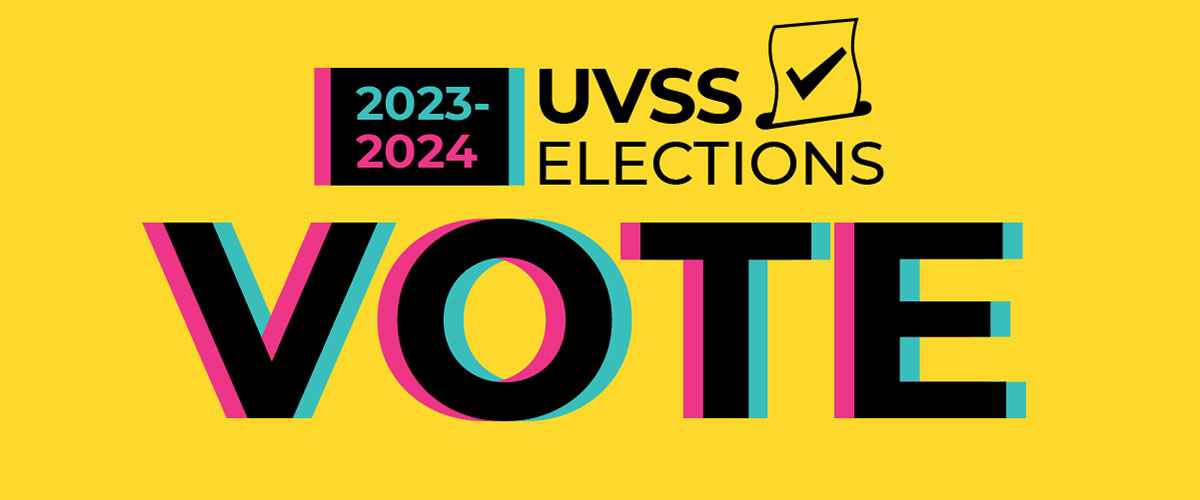Everything you need to know before you vote

Graphic via UVSS.
UVSS election season is upon us, and campaigns are in overdrive. You’ve probably seen UVSS Board members tabling outside of the SUB or had classmates present in class about their intent to run and why you should vote for them. With a shakeup of how the UVSS Board will look this year, there is a lot to unpack in order for students to understand what they are voting for and how to do so.
Last year, the UVSS voted to change the structure of the Board of Directors. Currently, there are five lead directors, 11 directors at large, one director of international student relations, four advocacy group representatives, and a Native Students’ Union representative. The new structure will keep the same number of seats, but nine of the director at large spots will become faculty representatives.
The addition of faculty representatives means that students of each faculty can vote for a representative (i.e. social sciences, law, science, etc.). The faculty member with the most votes will claim the role. However, in the event that no one from your faculty runs, another candidate will be appointed by the newly-elected Board to a director at large position in order to fill all the seats on the Board.
Ton Tran, the current director of outreach and university relations, explained that this change will bring variety to the Board. “The whole goal is just to increase the diversity of the Board,” said Tran. “There’s nobody on our Board right now that’s taking law or that’s in art.”
Aside from electing those who fill these positions on the Board of Directors, it is important for students to understand that they also have a say in motions put to referendum vote by the UVSS. This year there are four referendum questions, and students can vote yes or no to each of them.
The first was put forward by Lindsay Worden of the UVic Sustainability Project (UVSP). Worden seeks to increase funding for the UVSP by 50 cents per full-time student and 25 cents per part-time student. This increase in funding would help to expand programs, diversify initiatives, and increase staff.
Izzy Adachi, the current director of campaigns and community relations, has proposed two motions to be put to referendum. The first is tying the UVSS fees to B.C.’s annual all-items Consumer Price Index. This would allow the UVSS to raise fees based on the previous year’s inflation. The benefit of allowing the UVSS to raise fees by up to 2.5 per cent per year is that the student union would be better equipped to continue providing low cost services to students.
Adachi’s second referendum proposal involves establishing a $2 fee per full-time student ($1 per part-time student) to prepare UVSS operations for climate change. The fee would last seven years, from September 2023 until August 2030, and the money would go towards infrastructure and services meant to combat the effects of climate change on the SUB.
The fourth and final referendum question is for a fee increase of $1.05 per full-time student ($0.525 per part-time student) for the Gender Empowerment Centre (GEM) at UVic. The increase would go towards free emergency contraceptives and pregnancy tests, which the GEM has seen a 70 per cent increase in demand for compared to last year. It would also go towards providing more programs and resources for students, and would be their first fee increase since the fee was introduced 30 years ago.
While at face value fee increases might not be very attractive, all four questions seek to benefit students by providing more opportunities, services, and resources in important areas on campus. Students do get to vote on each matter individually, but the referenda need a quota of 15 per cent of the student body to vote in order for any motion to pass. More information on this is available on the UVSS Electoral Office website.
Students can vote online by clicking the link on the UVSS Electoral Office home page between March 23 and March 27. Students will be prompted to log in using their UVic credentials, which will allow them to vote for all the positions and questions, including their faculty representatives, and for international students, the director of international student relations.
After last year’s historically low turnout of only four per cent, Tran urges students to vote for important referendum questions that affect their university experience. “I really highly encourage you to vote,” he said. “Once you put even one foot in the door, you really recognize the amount of services and advocacy that the Student Union provides.”







